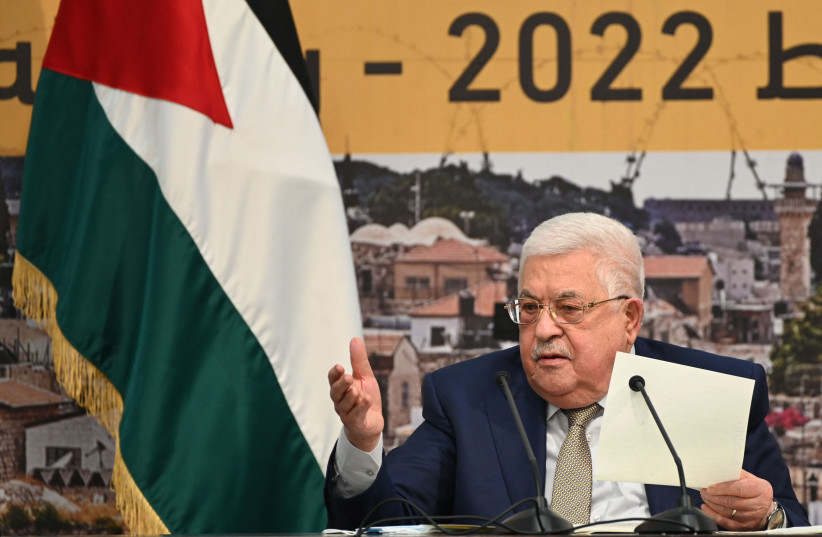It has been many years since Palestinian Authority President Mahmoud Abbas found himself caught between a rock and a hard place.
On Tuesday night, hours after the shooting attack in Bnei Brak in which five people were killed by a terrorist from the village of Yabad near Jenin, Abbas’s office issued a statement headlined: “The President condemns the killing of Israeli civilians this evening.”
The statement, published on the website of the PA’s official news agency, Wafa, read: “The President of the State of Palestine, Mahmoud Abbas, expressed his condemnation of the killing of Israeli civilians this evening, and stressed that the killing of Palestinian and Israeli civilians only leads to a further deterioration of the situation, as we all strive to achieve stability, especially as we are approaching the holy month of Ramadan and Christian and Jewish holidays. President Abbas warned against exploiting this incident to carry out attacks and reactions against our Palestinian people by settlers and others, and indicated that the cycle of violence confirms that permanent, comprehensive and just peace is the shortest and correct way to provide security and stability for the Palestinian and Israeli peoples and the peoples of the region.”
In recent years, Abbas has refrained from publicly condemning terrorist attacks against Israel, although he has repeatedly stated that he is opposed to violence and terrorism. He also did not comment on the ISIS-inspired terrorist attacks in Beersheba and Hadera.
That’s why the statement of condemnation released by his office surprised – and enraged – many Palestinians.

Abbas has had good reason not to denounce the endless terrorist attacks perpetrated by Palestinians against Israelis. He knows very well that such condemnations would be anathema to many Palestinians, especially his political rivals in Hamas and Palestinian Islamic Jihad.
Here’s how it works: Palestinian leaders have radicalized their people against Israel to the point where Abbas and senior officials in Ramallah are no longer capable of uttering a word against terrorist attacks targeting Israeli civilians.
The radicalization is taking place mainly through the harsh anti-Israel rhetoric of the Palestinian leaders and the media, especially social media platforms.
The process of delegitimizing Israel and demonizing Jews has made it dangerous, if not impossible, for any Palestinian to condemn a terrorist attack against Israelis.
So what made Abbas change his mind, and instruct his office to release the denunciation of the Bnei Brak terrorist attack?
A Palestinian official in Ramallah confirmed on Wednesday that the statement was published as a result of “pressure from certain parties in the Israeli government,” an apparent reference to the entourage of Defense Minister Benny Gantz.
Abbas released the statement as part of an effort to appease certain officials in Israel (and probably the US administration too). But while he may have pleased some officials in Jerusalem and Washington, Abbas’s condemnation infuriated a large number of Palestinians.
The 86-year-old Abbas is already facing sharp criticism from many Palestinians over his refusal to halt security coordination between PA security forces and the IDF.
His political rivals keep reminding the Palestinian public of his 2014 statement, in which he told a group of Israelis visiting him in his office in Ramallah: “Security coordination is sacred and will continue whether we agree or disagree on policy.”
For most Palestinians, security coordination is associated with extremely negative connotations, including treason and collaboration with the Israeli enemy.
Since the release of the statement of condemnation on Tuesday night, the old allegations against Abbas have resurfaced, particularly on social media.
He is being accused, among other things, of “equating” Palestinians killed by Israel with Israelis killed by Palestinians.
Abbas has also found himself stuck between the hammer and anvil over his ruling Fatah faction celebrating the Bnei Brak terrorist attack and endorsing the perpetrator, Dia Hamarsheh, as one of its members.
Several Fatah activists expressed outrage at Abbas’s statement of condemnation, and praised Hamarsheh as a “hero” and “martyr.”
This is extremely embarrassing for Abbas, mainly because it underscores the disconnect between him and large portions of Fatah, especially representatives of the “young guard” within the faction.
That the PA security forces were not able to detect the terrorist before he set out on his deadly mission is also seen as an embarrassment for Abbas. Yet had his security forces arrested Hamarsheh before the attack, they would have been accused by many of “collaboration” with Israel.
Abbas knows that in order to survive, he has to continue walking a fine line: he has to placate his friends in the US, Israel and the European Union countries, but he also needs to prove to his people, day and night, that he is not a “traitor” and “puppet” in the hands of Israel and the US.
This is why Abbas will continue to play the double game that he has played for many years. He will continue to incite against Israel and publicly glorify and support Palestinian “martyrs” and security prisoners, while at the same time maintaining the security coordination with Israel that props him up in the saddle of power.
